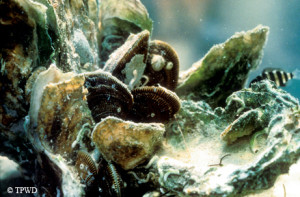We have much more to do and your continued support is needed now more than ever.
Gulf Coast Oysters in Peril
If you’ve ordered Gulf oysters at a restaurant this summer, then you’ve noticed their prices have gone up. Way up.

“Public reefs typically would produce anywhere from 3 million to 7 million pounds of oyster meat a year. In 2010 and 2011, production dropped to barely 2 million pounds, then nosedived to just 563,100 pounds in 2012 before rising to 954,950 pounds last year.
The other Gulf States aren’t exempt from the oyster decline either. The cause of their decline is most likely due to a combination of factors cited in the media, such as hurricanes, drought, a booming coastal population, floods, and the Deepwater Horizon oil disaster of 2010.
Mississippi and Alabama have also reported on the decreased oyster population and the boom in their prices at restaurants. Chris Nelson is the vice president of Bon Secour Fisheries Inc. in Alabama, and he recently told the San Antonio Express News that:
“The impact of all these different problems, challenges along the Gulf Coast, have led to an historical low point in the production of oysters.”
The efforts to keep up with demand for oysters poses a potential threat to the resource as well because harvesters may be tempted to take juvenile oysters that still need time to grow and provide important functions in our bays and estuaries.
Regarding the concern over decreasing oyster populations in Texas, Bryan Legare of the Texas Parks and Wildlife Department also reported to the San Antonio Express News:
“Drought plus a growing population equals no water entering the bays. The reservoirs aren’t releasing as much water as they need to for environmental concerns.”

Right now, all five Gulf Coast States are planning how they will spend billions of dollars of Deepwater Horizon oil spill recovery money. This is money allocated to Gulf States from the RESTORE Act, to be spent on restoration of the Gulf’s coastal region and marine environment.
Spending oil spill recovery money on projects and programs that will either restore or enhance Gulf oysters, like projects aimed at protecting our bays and estuaries, will not only benefit the health of the Gulf ecosystem, but will sustain our economy as well.
![]() The National Wildlife Federation is working to restore the Gulf of Mexico for people and wildlife from Florida to Texas, and we need your help to continue our efforts. Please consider making a donation today!
The National Wildlife Federation is working to restore the Gulf of Mexico for people and wildlife from Florida to Texas, and we need your help to continue our efforts. Please consider making a donation today!





















